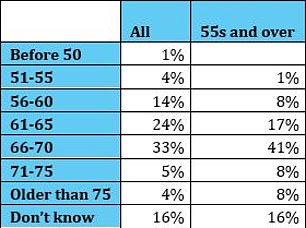When will you retire? Use our retirement calculator to find out when you can afford to stop working
A third of adults across all age groups expect to retire between the ages of 66 and 70, new research shows.
Only 5 percent expect to stop working before they are 55, while 14 percent think they can do so between the ages of 56 and 60, and 24 percent aim for the age of 61 to 65.
Nearly a fifth think they will retire before age 60.
But many people can’t or won’t set a date, with 16 people saying they don’t know in a Hargreaves Lansdown poll.
The state pension age is currently 66 years and will gradually increase to 67 years between 2026 and 2028. Meanwhile, the minimum age to receive a private pension will increase overnight from 55 to 57 on April 6, 2028.
People in their mid-to-late 40s and early 50s should therefore start planning ahead if they want to retire early, or plan to use some of their retirement savings to pay off debts such as mortgages or cover other important expenses.
It’s especially important to know the age rules for your work and other personal pensions because some people can still access their money at age 55 depending on what they say.
Do your research: It’s important to know the age rules at your workplace or other private pension, and plan ahead if you want to retire early
“The over-55s are more likely to be in the dark than those aged 18 to 34 about their pension prospects,” says Helen Morrissey, head of pensions analysis at Hargreaves.
‘This could have several reasons. Some may love what they do and have no intention of stopping, others may not really be into it yet.
“Others may have realized that they don’t have enough at the moment and are playing catch-up, so they want to keep their options open.
‘It can also be young people who have confidence in when they want it to happen – before complicated issues arise – like affordability!’
Hargreaves surveyed 1,600 people who are not retired but otherwise weighted to be representative of Britain’s adult population.
Separate research from Compare the Market shows that retirement is the life milestone that people postpone the longest due to the cost of living, at an average of 3.9 years.
Buying a first home came in second, with an average delay of 2.5 years, according to the poll of 2,000 people in Britain.
Meanwhile, an influential sector study looks at what individuals and couples need to save to have a minimal, moderate or comfortable retirement.
Couples need £22,400 for a basic lifestyle, £43,100 for a moderate standard of living and £59,000 for a more prosperous pension.
The Research Association Pension and Life Savings assumes you and your partner are both eligible for a full state pension, which rose to £11,500 per year in April, but the figures exclude income tax, housing costs (if you’re renting or still paying off a mortgage) or healthcare costs.
How to plan your retirement
Helen Morrissey from Hargreaves Lansdown offers the following tips, and scroll down to find out what to do if you’re worried you haven’t saved enough to retire when you want.
1. Check your pension and pension planning occasionally
Having an idea of what you want from your retirement can give you an idea of how much it will cost and this in turn can give you an idea of how much you need to have saved.
2. Use an online calculator (see box above)
You can enter your pension details. You will then see how much you are on track and how much income you will receive when you retire.
You can even model the long-term effects of a larger contribution over time, if you can afford the additional contributions.

Results from a Hargreaves Lansdown survey on when people expect to retire
3. Make sure you don’t lose sight of old pensions in the workplace
This is easy to do when we move around. That small pension you had in a job twenty years ago could very well have grown into a significant sum and can have a big impact on how much you get.
It can even bring your retirement forward by a few years. Make sure you review your paperwork and if you have lost track of a pension, contact the the government’s Pension Investigation Service to see if they can help you find it.
4. Consider merging your pensions
Having them all in one place will give you a better idea of what you have and improve your retirement decision-making. However, make sure you don’t pay expensive exit fees as a result.
You also need to make sure you don’t miss out on benefits, such as guaranteed annuity rates, that could boost your retirement income.
5. Check your state pension
This forms the basis of people’s retirement planning and there are very few people who do not depend on it to some extent.
The fact that the most popular response to when people retire is between 66 and 70 is testament to this, as the state pension age is currently 66 and on the rise.
Some links in this article may be affiliate links. If you click on it, we may earn a small commission. That helps us fund This Is Money and keep it free to use. We do not write articles to promote products. We do not allow a commercial relationship to compromise our editorial independence.

